- Home
- Kristin Cashore
Bitterblue skt-3 Page 2
Bitterblue skt-3 Read online
Page 2
"How would I know?" Bitterblue exclaimed. "What do I know about the people and their businesses?"
Sometimes she felt lost behind this desk in the middle of the room, this desk that was so big for her smallness. She could hear every word they were being tactful enough not to say: that she'd made a fool of herself; that she'd proven the queen to be young, silly, and naïve about her station. It had seemed a powerful thing to say at the time. Were her instincts so terrible?
"It's all right, Bitterblue," said Thiel, more gently now. "We can move on from this."
There was kindness in the use of her name rather than her title. The glacier showing its willingness to recede. Bitterblue looked into the eyes of her top adviser and saw that he was worried, anxious that he'd harangued her too much. "I'll make no more declarations without consulting you first," she said quietly.
"There now," said Thiel, relieved. "See? That's a wise decision. Wisdom is queenly, Lady Queen."
FOR AN HOUR or so, Thiel kept her captive behind towers of paper. Runnemood, in contrast, circled along the windows, exclaiming at the pink light, bouncing on the balls of his feet, and distracting her with tales of consummately happy illiterate people. Finally, mercifully, he went away to some evening meeting with city lords. Runnemood was a pleasant man to look at and an adviser she needed, the one most adept at warding away ministers and lords who wished to talk Bitterblue's ear off with requests, complaints, and obesiances. But that was because he himself knew how to be pushy with words. His younger brother, Rood, was also one of Bitterblue's advisers. The two brothers, Thiel, and her secretary and fourth adviser, Darby, were all about sixty or so, though Runnemood didn't look it. The others did. All four had been advisers to Leck. "Were we short-staffed today?" Bitterblue asked Thiel. "I don't remember seeing Rood."
"Rood is resting today," said Thiel. "And Darby is unwell."
"Ah." Bitterblue understood the code: Rood was having one of his nervous episodes and Darby was drunk. She rested her forehead on the desk for a moment, afraid that otherwise she'd laugh. What would her uncle, who was the King of Lienid, think of the state of her advisers? King Ror had chosen these men as her team, judging them, on the basis of their previous experience, to be the men most knowledgeable about the kingdom's needs for recovery. Would their behavior today surprise him? Or were Ror's own advisers equally colorful? Perhaps this was the way in all seven kingdoms.
And perhaps it didn't matter. She had nothing to complain of when it came to her advisers' productivity, except perhaps that they were too productive. The paper that piled itself on her desk every day, every hour, was the evidence: taxes levied, court judgments rendered, prisons proposed, laws enacted, towns chartered; paper, paper, until her fingers smelled like paper and her eyes teared at the sight of paper and sometimes her head pounded.
"Watermelons," Bitterblue said into the surface of her desk.
"Lady Queen?" said Thiel.
Bitterblue rubbed at the heavy braids wound around her head, then sat up. "I never knew there were watermelon patches in the city, Thiel. On my next yearly tour, may I see one?"
"We intend your next tour to coincide with your uncle's visit this winter, Lady Queen. I'm no expert on watermelons, but I don't believe they're particularly impressive in January."
"Could I go out on a tour now?"
"Lady Queen, it is the very middle of August. When do you imagine we could make time for such a thing in August?"
The sky all around this tower was the color of watermelon flesh. The tall clock against the wall ticked the evening away, and above her, through the glass ceiling, the light darkened to purple. One star shone. "Oh, Thiel," Bitterblue said, sighing. "Go away, won't you?"
"I will, Lady Queen," said Thiel, "but first, I wish to discuss the matter of your marriage."
"No."
"You're eighteen, Lady Queen, with no heir. A number of the six kings have sons yet unmarried, including two of your own cousins—"
"Thiel, if you start listing princes again, I'll throw ink at you. If you so much as whisper the names of my cousins—"
"Lady Queen," Thiel said, talking over her, completely unperturbed, "as little as I wish to upset you, this is a reality that must be faced. You've developed a fine rapport with your cousin Skye in the course of his ambassadorial visits. When King Ror comes this winter, he'll probably bring Prince Skye with him. Between now and then, we'll have to have this discussion."
"We won't," Bitterblue said, clutching her pen hard. "There's nothing to discuss."
"We will," said Thiel firmly.
If she looked closely enough, Bitterblue could make out the lines of healed scars on Thiel's cheekbones. "There's something I'd like to discuss," she said. "Do you remember the time you came into my mother's rooms to say something to my father that made him angry and he brought you downstairs through the hidden door? What did he do to you down there?"
It was as if she'd blown out a candle. He stood before her, tall, gaunt, and confused. Then even the confusion faded and the light went out of his eyes. He smoothed his impeccable shirtfront, staring down at it, tugging, as if tidiness mattered greatly in this moment. Then he bowed once, quietly; turned; and walked out of the room.
LEFT ALONE, BITTERBLUE shuffled papers, signed things, sneezed at the dust—tried, and failed, to talk herself out of a small shame. She'd done it on purpose. She'd known full well that he wouldn't be able to bear her question. In fact, almost all of the men who worked in her offices, from her advisers to her ministers and clerks to her personal guard—those who had been Leck's men—flinched away from direct reminders of the time of Leck's reign—flinched away, or fell apart. It was the weapon she always used when one of them pushed her too far, for it was the only weapon she had that worked. She suspected that there'd be no more marriage talk for a while.
Her advisers had a single-mindedness that left her behind sometimes. That was why the marriage talk frightened her: Things that started as mere talk among them seemed to become real institutions, suddenly, forcefully, before she'd ever managed to comprehend them or form an opinion. It had happened with the law that gave blanket pardons for all crimes committed during Leck's reign. It had happened with the charter provision that allowed towns to break free of their governing lords and rule themselves. It had happened with the suggestion—just a suggestion!—to block off Leck's old living chambers, take down his animal cages in the back garden, and burn his belongings.
And it wasn't that she was necessarily opposed to any of these measures, or regretted her approval once things settled down enough for her to comprehend that she'd approved. It was only that she didn't know what she thought, she needed more time than they did, she couldn't always be rushing ahead the way they were, and it frustrated her to look back and realize that she'd let herself be pushed into something. "It's deliberate, Lady Queen," they'd told her, "a deliberate philosophy of forward-thinkingness. You're right to encourage it."
"But—"
"Lady Queen," Thiel had said gently, "we're trying to lift people out of Leck's spell and help them move on, you understand? Otherwise, people will wallow in their own upsetting stories. Have you spoken to your uncle about it?"
Yes, she had. Bitterblue's uncle, after Leck's death, had come halfway across the world for his niece. King Ror had created Monsea's new statutes, formed its ministries and courts, chosen its administrators, then passed the kingdom into Bitterblue's ten-year-old hands. He'd seen to the burning of Leck's body and mourned the murder of his own sister, Bitterblue's mother, who was gone. Ror had brought order out of chaos in Monsea. "Leck is still lodged in too many people's minds," he had said to her. "His Grace is a sickness that lingers, a nightmare you must help people to forget."
But how was forgetting possible? Could she forget her own father? Could she forget that her father had murdered her mother? How could she forget the rape of her own mind?
Bitterblue laid her pen down and went, cautiously, to an eastfacing window. She put a hand to the
frame to steady herself and rested her temple against the glass, closing her eyes until the falling sensation receded. At the base of her tower, the River Dell formed the city's northern boundary. Opening her eyes, she followed the river's south bank east, past the three bridges, past where she guessed the silver docks and lumber docks, fish and merchant docks to be. "Watermelon patch," she said, sighing. Of course, it was too far and too dark to see any such thing.
The River Dell here, as it lapped at the castle's north walls, was slow-moving and wide as a bay. The boggy ground on the opposite shore was undeveloped, untraveled except by those who lived in Monsea's far north, but still, for some unaccountable reason, her father had built the three bridges, each higher and more magnificent than any bridge needed to be. Winged Bridge, the closest, had a floor of white and blue marble, like clouds. Monster Bridge, the highest, had a walkway that rose as high as its highest arch. Winter Bridge, made of mirrors, was eerily hard to distinguish from the sky during the day, and sparkled with the light of the stars, the water, the city at night. They were purple and crimson shapes now in the sunset, the bridges, unreal and almost animal. Huge, slender creatures that stretched north across flashing water to useless land.
The falling sensation crept up on her again. Her father had told her a story of another sparkling city, also with bridges and a river—a rushing river whose water leapt off a cliff, plummeted through the air, and plunged into the sea far below. Bitterblue had laughed in delight to hear of that flying river. She had been five or six. She'd been sitting in his lap.
Leck, who tortured animals. Leck, who made little girls and hundreds of other people disappear. Leck, who became obsessed with me and chased me across the world.
Why do I push myself to these windows when I know I'll be too dizzy to get a good look at anything? What is it that I'm trying to see?
SHE ENTERED THE foyer of her rooms that night, turned right to her sitting room, and found Helda knitting on the sofa. The servant girl Fox was washing the windows.
Helda, who was Bitterblue's housekeeper, ladyservant, and spymaster, reached a hand into a pocket and passed Bitterblue two letters. "Here you are, dear. I'll ring for dinner," she said, heaving herself up, patting her white hair, and leaving the room.
"Oh!" Bitterblue flushed with pleasure. "Two letters." She broke open the plain seals and peeked inside. Both were ciphered and both written in hands she knew instantly, the messy scrawl belonging to Lady Katsa of the Middluns, the careful, strong markings belonging to Prince Po of Lienid, who was Skye's younger brother, and, with Skye, one of the two unmarried sons of Ror who would make Bitterblue dreadful husbands. Truly, comically dreadful.
She found a corner of the sofa to curl up in and read Po's first. Po had lost his sight eight years ago. He could not read words on paper, for while the part of his Grace that allowed him to sense the physical world around him compensated for many aspects of his blindness, he had trouble demystifying differences on flat surfaces, and he could not sense color. He wrote in large letters with a sharp piece of graphite, because graphite was easier to control than ink, and he wrote with a ruler as a guide, since he could not see what he was writing. He also used a small set of movable wooden letters as a reference to help him keep his own ciphers straight in his mind.
Just now, his letter said, he was in the northern kingdom of Nander, stirring up trouble. Switching letters, Bitterblue read that Katsa, who was an unparalleled fighter and Graced with survival skills, had been dividing her time among the kingdoms of Estill, Sunder, and Wester, where she was also stirring up trouble. That was what they did with themselves, those two Gracelings, along with a small band of friends: They stirred up trouble on a serious scale—bribery, coercion, sabotage, organized rebellion—all directed at stopping the worst behavior of the world's most seriously corrupt kings. "King Drowden of Nander has been imprisoning his nobles randomly and executing them, because he knows some are disloyal, but isn't sure which," wrote Po. "We're going to spring them from prison. Giddon and I have been teaching townspeople to fight. There's going to be a revolution, Cousin."
Both letters ended the same way. Po and Katsa hadn't seen each other in months, and neither of them had seen Bitterblue in over a year. Both intended to come to Bitterblue as soon as their work could spare them, and stay as long as they could.
Bitterblue was so happy that she curled herself up in a ball on the sofa and hugged a pillow for a full minute.
At the far end of the room, Fox had managed to climb to the very top of the tall windows, bracing her hands and feet against the window frames. There, she rubbed at her own reflection vigorously, polishing the surface to a high shine. Wearing a divided skirt of blue, Fox matched her surroundings, for Bitterblue's sitting room was blue, from the carpet to the blue-and-gold walls to the ceiling, which was midnight blue and stenciled with gold and scarlet stars. The royal crown sat on a blue velvet cushion in this room, always, except when Bitterblue wore it. A hanging of a fantastical sky-blue horse with green eyes marked the hidden door that had once given passage down to Leck's rooms below, before people had come in and done something to block off the stairway.
Fox was a Graceling, with one eye pale gray and the other dark gray, and she was startlingly pretty, almost glamorous, red-haired and strong-featured. Her Grace was a strange one: fearlessness. But it was not fearlessness combined with recklessness; it was only a lack of the unpleasant sensation of fear; and, in fact, Fox had what Bitterblue interpreted to be an almost mathematical ability to calculate physical consequences. Fox knew better than anyone what was likely to happen if she slipped and fell out of the window. It was that knowledge that kept her careful, rather than the feeling of fear.
Bitterblue thought such a Grace was wasted in a castle servant, but in post-Leck Monsea, Gracelings were not the property of the kings; they were free to work where they liked. And Fox seemed to like doing odd jobs in the upper north floors of the castle—though Helda did talk about trying her as a spy sometime.
"Do you live in the castle, Fox?" asked Bitterblue.
"No, Lady Queen," answered Fox from her perch. "I live in the east city."
"You work strange hours, don't you?"
"It suits me, Lady Queen," Fox responded. "Sometimes, I work the night through."
"How do you get in and out of the castle at such odd hours? Does the Door Guard ever give you a hard time?"
"Well, it's never any trouble getting out; they'll let anyone out, Lady Queen. But to come in at the gatehouse at night, I show a bracelet that Helda's given me, and to get past the Lienid at your own doors, I show the bracelet again and give the password."
"The password?"
"It changes every day, Lady Queen."
"And how do you get the password yourself?"
"Helda hides it for us somewhere, in a different place every day of the week, Lady Queen."
"Oh? What is it today?"
" 'Chocolate pancake,' Lady Queen," said Fox.
Bitterblue lay on her back on the sofa for a while, giving this its due consideration. Every morning at breakfast, Helda asked Bitterblue to name a word or words that could serve as the key for any ciphered notes they were likely to pass to each other during the day. Yesterday morning, Bitterblue had chosen "chocolate pancake." "What was yesterday's password, Fox?"
" 'Salted caramel,'" said Fox.
Which had been the key Bitterblue had chosen two days ago. "What delicious passwords," Bitterblue said idly, an idea forming in her mind.
"Yes, Helda's passwords always make me hungry," Fox said.
A hood lay draped on the edge of Bitterblue's sofa, deep blue, like the sofa. Fox's hood, certainly; Bitterblue had seen her wear simple coverings like that before. It was much plainer than any of Bitterblue's coats.
"How often do you suppose the Lienid Door Guard changes guard?" Bitterblue asked Fox.
"Every hour on the hour, Lady Queen," Fox responded.
"Every hour! That's quite often."
"Yes, L
ady Queen," replied Fox blandly. "I don't suppose there's much continuity in what any of them sees."
Fox stood on the solid floor again, bent over a bucket of suds, her back to the queen.
Bitterblue took the hood, tucked it under her arm, and slipped out of the room.
BITTERBLUE HAD WATCHED spies enter her rooms at night before, hooded, hunched, unrecognizable until they'd removed their covering garments. Her Lienid Door Guard, a gift from King Ror, guarded the castle's main entrance and the entrance to Bitterblue's living quarters, and did so with discretion. They were under no obligation to answer the questions of anyone but Bitterblue and Helda, not even the Monsean Guard, which was the kingdom's official army and police. This gave Bitterblue's personal spies the freedom to come and go without their presence being noted by her administration. It was a strange little provision of Ror's, to protect Bitterblue's privacy. Ror had a similar arrangement in Lienid.
The bracelet was no problem, for the bracelet Helda gave her spies was a plain leather cord on which hung a replica of a ring Ashen had worn. It was a proper Lienid ring in design: gold, inset with tiny, sparkly, deep gray stones. Every ring worn by a Lienid represented a particular family member, and this was the ring Ashen had worn for Bitterblue. Bitterblue had the original. She kept it in her mother's wooden chest in the bedroom, along with all of Ashen's rings.
It was strangely affecting to tie this ring to her wrist. Her mother had shown it to her many times, explained that she'd chosen the stones to match Bitterblue's eyes. Bitterblue hugged her wrist to her body, trying to decide what her mother would think of what she was about to do.
Well. And Mama and I snuck out of the castle once too. Though not this way; by the windows. And with good reason. She was trying to save me from him.
She did save me. She sent me on ahead and stayed behind to die.
Mama, I'm not sure why I'm doing what I'm about to do. Something is missing, do you see? Piles of paper at my desk in my tower, day in, day out. That can't be all there is. You understand, don't you?

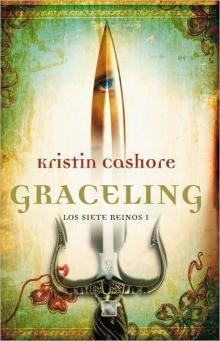 Graceling
Graceling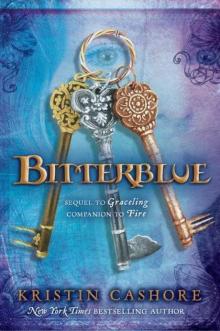 Bitterblue
Bitterblue Fire
Fire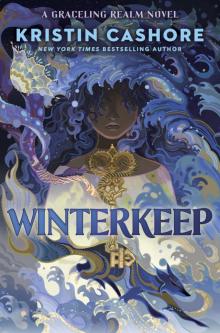 Winterkeep
Winterkeep Helen Keller in Love
Helen Keller in Love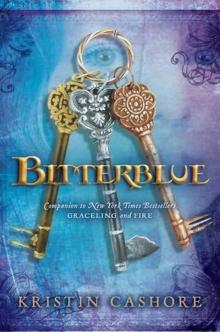 Bitterblue skt-3
Bitterblue skt-3 Fire skt-2
Fire skt-2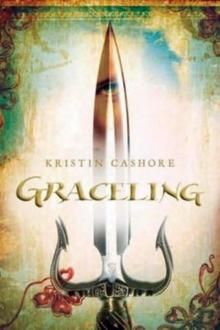 Graceling skt-1
Graceling skt-1